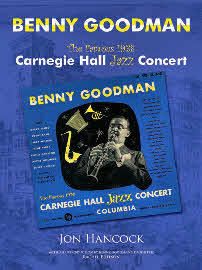 I recently finished reading an excellent new book by Jon Hancock about Benny Goodman’s 1938 Carnegie Hall debut. The concert, which was released as a long-playing record album in 1950 and is still in print to this day, was a landmark event, the first time that an entire evening of jazz was presented at America’s best-known and most prestigious concert hall. It was also an exceedingly risky proposition for Goodman, who in 1938 was the equivalent of a swing-era rock star. Such folk didn’t go anywhere near Carnegie Hall in the Thirties, and as I read Hancock’s book, I asked myself: why did a successful performer like Benny Goodman feel the need to give a concert there? It occurred to me that Goodman, who had extensive classical training and spent much of the rest of his life playing Brahms and Mozart in addition to the jazz that made him famous, might have questioned his own musical worth and felt that a Carnegie Hall appearance would give him cultural legitimacy.
I recently finished reading an excellent new book by Jon Hancock about Benny Goodman’s 1938 Carnegie Hall debut. The concert, which was released as a long-playing record album in 1950 and is still in print to this day, was a landmark event, the first time that an entire evening of jazz was presented at America’s best-known and most prestigious concert hall. It was also an exceedingly risky proposition for Goodman, who in 1938 was the equivalent of a swing-era rock star. Such folk didn’t go anywhere near Carnegie Hall in the Thirties, and as I read Hancock’s book, I asked myself: why did a successful performer like Benny Goodman feel the need to give a concert there? It occurred to me that Goodman, who had extensive classical training and spent much of the rest of his life playing Brahms and Mozart in addition to the jazz that made him famous, might have questioned his own musical worth and felt that a Carnegie Hall appearance would give him cultural legitimacy.
Needless to say, Goodman was by no means the first artist to suffer from deep-seated doubts about his work. Any number of other major artists, including John Keats and Benjamin Britten, have found their private fears to be at times all but incapacitating. My “Sightings” column for Saturday’s Wall Street Journal speculates on what causes great artists to question their own accomplishments–and whether such self-doubt is always a bad thing. If you’re curious, pick up a copy of tomorrow’s Journal and see what I have to say.
UPDATE: Read the whole thing here.
Terry Teachout on the arts in New York City
